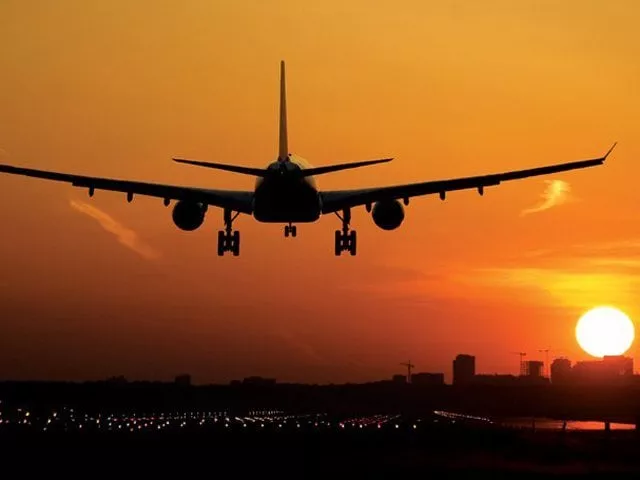Pakistan mulls over banning inbound flights from May 5 amid virus upsurge
NCOC notifies May 10-15 holidays, decides to reduce inbound flights to Pakistan from May 5 to May 20
ISLAMABAD:The National Command and Operation Centre (NCOC) notified on Thursday a “Stay Home, Stay Safe” strategy for Eidul Fitr holidays, as the third wave of Covid-19 continued unabated with the single-day tally of new cases staying above 5,000 and the death toll crossing 150 for second straight day.
The NCOC also decided to reduce inbound flights to Pakistan from May 5 to May 20. The forum said that detailed instructions regarding the reduction in flights would be provided by the Civil Aviation Authority (CAA).
It was decided that these restrictions will be reviewed on May 18 while detailed instructions will be issued by the CAA.
The NCOC unveiled a raft of restrictions under its strategy for a period of May 8-16, including the Eid holidays from May 10 to May 15.
Read more: Govt to import 6,000 tonnes of oxygen: Umar
“Current spike of Covid-19 in the country merits effective measures to arrest its further spread with special emphasis on reducing mobility during forthcoming Eid-ul-Fitr,” the NCOC said in a statement. The new measures were in conjunction with its previous guidelines issued on April 23 and April 27.
The statement said that the NCOC would issue comprehensive standard operating procedures (SOPs) and guidelines for the Yom-e-Ali, Itekaf, Shab-e-Qadar, Jummatul Wida and the Eid congregations by Saturday (tomorrow).
Under the “Stay Home, Stay Safe” strategy, all markets, businesses and shops will remain closed except essential services including grocery stores, pharmacies, medical facilities and vaccination centres, vegetable, fruit and meat shops, bakeries, petrol pumps, and food takeaways.
Similarly, e-commerce outlets, utility services, such as electricity, natural gas, internet, cellular networks, telecom, call centres, and media will also have exemption. There will be complete ban on Chand Raat bazaars, including mehndi, jewelry, ornaments and clothing stalls.
During the Eid holidays, the NCOC statement said, all tourist resorts, formal and informal picnic spots, public parks, shopping malls, all hotels and restaurants in and around tourist and picnic spots will remain closed.
It added that travel nodes leading to tourist and picnic spots will be closed, particularly Murree, Galiyat, Swat-Kalam, sea view, beaches and the northern areas and other tourist destinations. However, locals in Gilgit-Baltistan and Azad Jammu and Kashmir would be allowed to travel.
The NCOC also banned the inter-provincial, inter-city and intra-city public transport except private vehicles, taxis/cabs, rikshaws with 50% occupancy. It said that additional trains to manage passenger load will run until May 7, thereafter normal train operation will resume with 70% occupancy.
Also read: Pakistan records 5,112 new positive cases, 131 deaths in 24 hours
Continuous messages will be broadcast through print, electronic and social media on the theme of ‘Stay Home, Stay Safe for Eidul Fitr 2021’, while media channels will air special Eid holiday programmes to keep public at home. Uninterrupted electricity supply will be ensured during Eid.
The new measures come alongside other Covid-related restrictions the forum introduced recently, including travel curbs on 23 countries and extended travel restrictions till April 30 and postponement of exams at all levels.
Education Minister Shafqat Mehmood had announced earlier this week that all exams had been postponed till June 15. In an interview on Thursday he clarified that the government did not intend to pass any students without taking examinations.
During the meeting, the NCOC reviewed the production and supply of oxygen, granting permission to import 6,000 metric tonnes of oxygen and 5,000 oxygen cylinders to shore up healthcare facilities in the country.
Besides this, the NCOC also allowed the import of 20 cryogenic tanks and decided to shut down the scrap industry of Misri Shah so that oxygen could be diverted to the healthcare sector instead. The meeting also decided that vaccination of people aged between 40 and above will begin from May 3.
Coronavirus first emerged in the country in February 2020. The first wave of the pandemic started ebbing after seeing its peak in June but the cases surged again towards the end of the year, dubbed by the experts as the second wave.
However, a fast spreading and a deadlier third wave emerged in the first week of March and soon the single-day tally of new cases crossed 5,000 while the number of fatalities topped 100. In the first year, the country witnessed nearly 580,000 cases but the last two months’ tally is over 238,000.
On Thursday, the national tally of active Covid cases rose to 89,838 with 5,480 new cases during the last 24 hours. During the same period, the NCOC said, 151 patients, of them 128 in the hospitals, including 60 on ventilators.
Most of the deaths occurred in Punjab, where 103 people breathed their last, followed by Khyber Pakhtunkhwa (K-P) where 37 patients died. The nationwide death toll from the disease has now risen to 17,680, according to the NCOC daily update.
As of Thursday, the national caseload of the disease increased to 815,711. The NCOC said that 708,193 people had recovered from the disease so far, including 3,699 on Wednesday. The recovery ratio is more than 90%, it added.


COMMENTS
Comments are moderated and generally will be posted if they are on-topic and not abusive.
For more information, please see our Comments FAQ